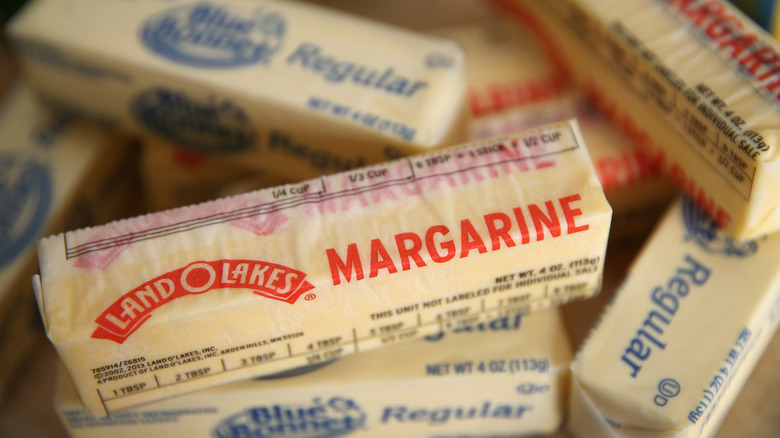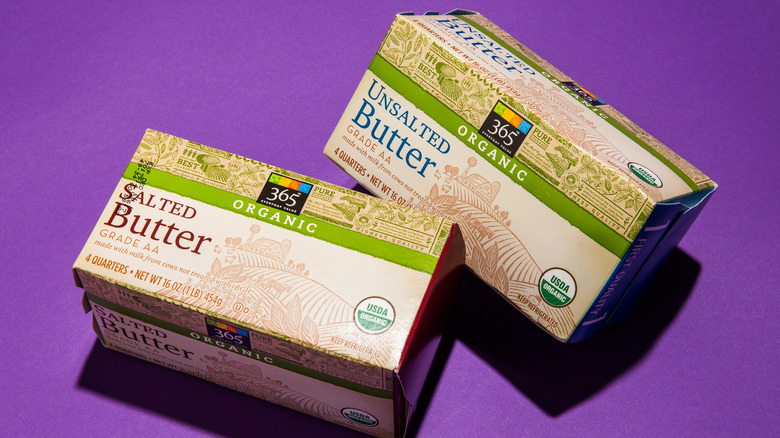The Myth About Margarine You Can Stop Believing
Butter makes just about everything better. It's one of those food facts that's simply not up for debate. Making a batch of homemade chocolate chip cookies? Double the butter, and you'll be in for a delicious treat. Overcooked biscuits before family dinner? A quick side of butter should fix that! Out of cream cheese for your morning bagel? Extra butter — the best way to start your day.
While butter might make your food taste better, it might not make you feel better in the long run. That's because nutritionists suggest avoiding butter, at least on the regular, due to its high saturated fat content. This fat content was heavily associated with a greater risk of health troubles down the line, particularly heart health and cholesterol issues, explains Harvard Health. Cue margarine: a vegetable-oil based spread that began to fly off shelves thanks to its advertised buttery flavor, without all of the heart-hurting fats. USDA data shows that at the height of the craze in 1976, the average yearly margarine consumption hit 12 pounds per person, beating about 4.5 pounds of butter. The jury's still out on whether margarine actually matches the taste of the real thing, but for many, it's decent enough to do the job.
But with a little research, consumers might find that their beloved I Can't Believe It's Not Butter quickly turns to, well, I Can't Believe It's Worse Than Butter — and depending on who you ask, it might not just be in terms of taste.
Margarine isn't all that healthy, either
According to the Mayo Clinic, margarine — especially in stick form — can be packed with trans fats, which are minimal in butter. Trans fats are considerably harder on your heart than saturated fats, and can lower the amount of good cholesterol in the body.
A 2016 study posted by the National Library of Medicine showed that an increase in trans fat consumption is actually linked to increased risk for coronary heart disease — which is the very thing that margarine was marketed to avoid — and a possible association with Alzheimer's disease. This data slowly came to light over 15 years, up until the FDA deemed trans fats unsafe in 2015, so it's no wonder that this myth about margarine is still lingering in consumers' minds. Nowadays, the FDA requires trans fat to be identified on any foods, so always double-check your margarine to see if it's worth ditching the butter at all (via Harvard Health).
Another common margarine misconception is front and center on the nutritional facts. Take some extra time in the dairy aisle, and take a closer look at the labels of each. You'll find that margarine and butter are relatively equal in calories. This might come as a shock for those who mistakenly choose margarine over butter, thinking that it's a "diet" version of the spread. While some margarines offer lower calories, they typically have the same count as butter, at a whopping 100 calories per tablespoon, notes Women's Health.
Butter is bouncing back
Butter, like most good things in life, isn't all that bad for you in moderation. The calorie count is still a hit, and it should be avoided by those with health and cholesterol concerns, but on the day-to-day, the right organic butter can actually be a great source for healthy saturated fats. A medical doctor shared with "Today" that butter has become a bit of a fear food among the public thanks to overwhelming and misleading "nutrition whiplash" from "bad science" and "confusing headlines," but it doesn't deserve its poor reputation when compared to margarine.
As more research comes out regarding what's actually in butter versus its supposedly low-calorie alternative, consumers have started to cross off margarine and add the original spread back to their shopping lists. Unilever took note of the shift and actually sold their global margarine spreads business back in 2017. According to Forbes, their popular butter alternative brands I Can't Believe It's Not Butter and Country Crock were sold to KKR, an investment firm looking to revitalize the dwindling margarine market. They've had some success in positioning margarine as a "plant-based" option, rather than a better-for-you butter, but the nutrition facts remain the same.
Canada's The Western Producer also reports that butter sales jumped a notable 12.4% in 2020, indicating that butter is back. And while it still may not be the best for you, it's certainly no worse than margarine.


